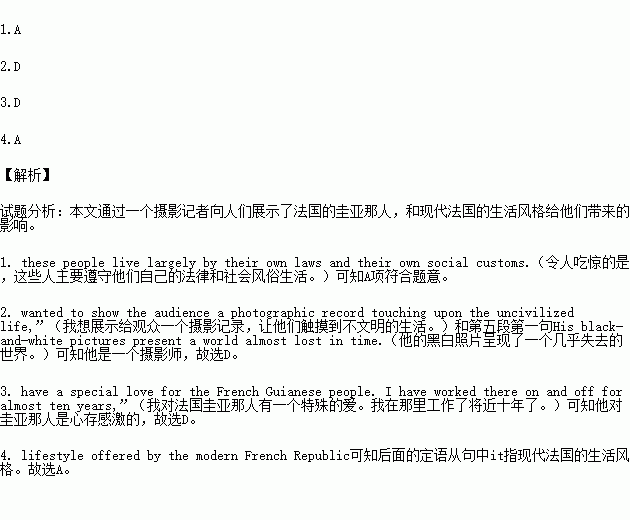题目内容
阅读理解。
In the depths of the French Guianese rainforest, there still remain unusual groups of indigenous(土著的) people. Surprisingly, these people live largely by their own laws and their own social customs. And yet, people in this area are in fact French citizens because it has been a colony(殖民地) of the French Republic since 1946. In theory, they should live by the French law is often ignored or unknown, thus making them into an interesting area of “lawlessness” in the world.
The lives of these people have finally been recorded thanks to the effects of a Frenchman form Paris called Gin. Gin spent five months in early 2015 exploring the most remote corners of this area, which sits on the edge of the Amazon rainforest, with half its population of only 250,000 living in its capital, Cayenne.
“I have a special love for the French Guianese people. I have worked there on and off for almost ten years,” says Gin. “I’ve been able to keep firm friendships with them. Thus I have been allowed to gain access to their living environment. I don’t see it as a lawless land. But rather I see it as an area of freedom.”
“I wanted to show the audience a photographic record touching upon the uncivilized life,” continues Gin. “I prefer to work in black and white, which allows me to show different specific worlds more clearly.”
His black-and-white pictures present a world almost lost in time. These pictures show people seemingly pushed into a world that they were unprepared for. These local citizens now have to balance their traditional self-supporting hunting lifestyle with the lifestyle offered by the modern French Republic, which brings with it not only necessary state welfare, but also alcoholism, betrayal and even suicide.
1.Why does the author feel surprised about the indigenous people in French Guiana?
A. They seldom follow the French law.
B. They often ignore the Guianese law.
C. They are separated from the modern world.
D. They are both Guianese and French citizens.
2.Gin introduced the special world of the indigenous Guianese as _________.
A. a tour guide B. a geographer
C. a flm director D. a photographer
3.What is Gin’s attitude towards the lives of the indigenous Guianese?
A. Cautious. B. Doubtful.
C. Uninterested. D. Appreciative.
4.What does the underlined word “it” in the last paragraph refer to?
A. The modern French lifestyle. B. The self-supporting hunting.
C. The uncivilized hunting. D. The French Republic.

